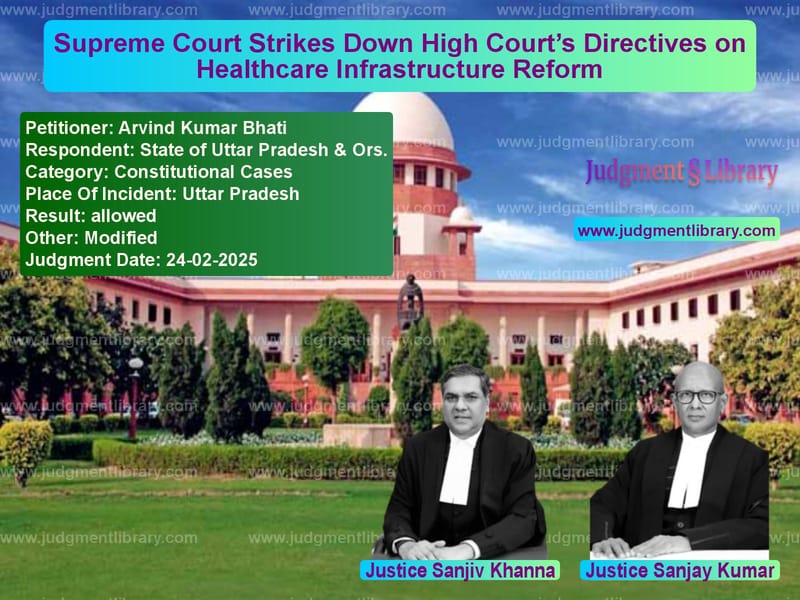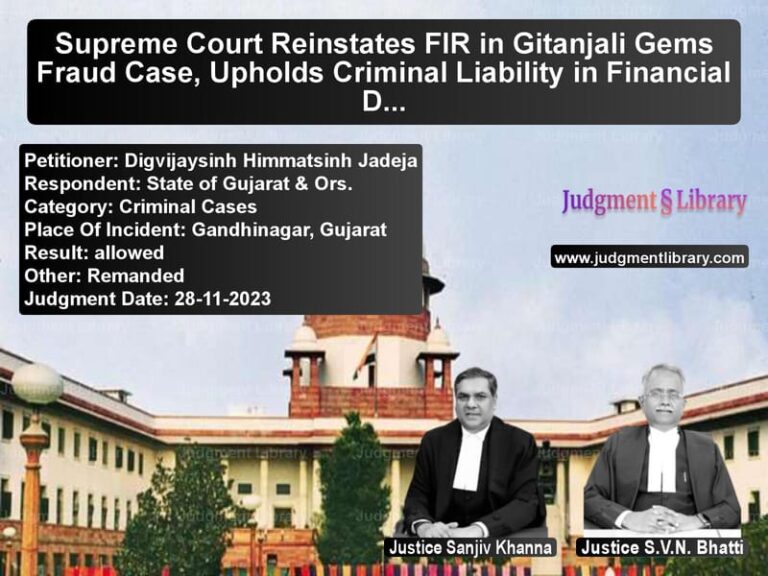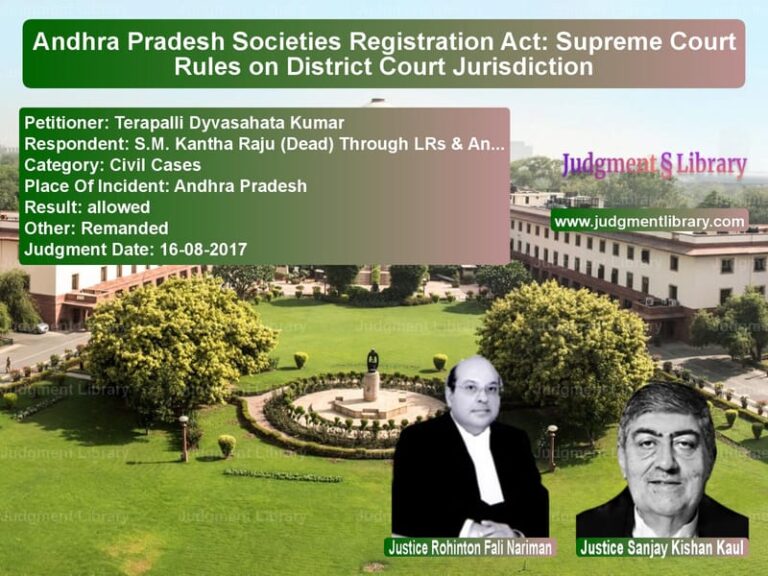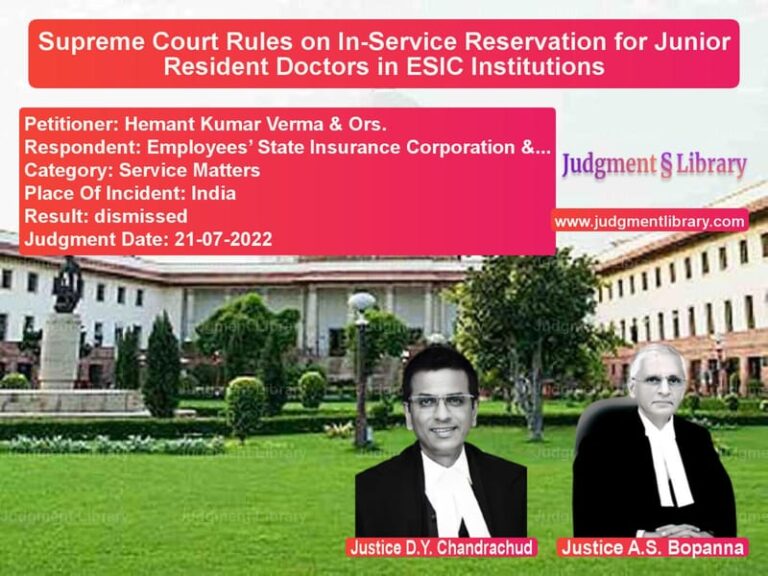Supreme Court Strikes Down High Court’s Directives on Healthcare Infrastructure Reform
The case of Arvind Kumar Bhati vs. State of Uttar Pradesh & Ors. addresses judicial overreach concerning healthcare infrastructure improvements. The Supreme Court ruled that certain directives issued by the Allahabad High Court regarding hospital management and public health policy in Uttar Pradesh were beyond the jurisdiction of writ courts. The judgment reinforces the principle that courts must not interfere in policy matters unless there is a clear violation of fundamental rights.
The appeal arose from a Public Interest Litigation (PIL) filed by Snehalata Singh and others, which led to sweeping directives for healthcare reform, including mandatory traffic management measures, penalties for vehicle owners without parking facilities, and the creation of dedicated ambulance corridors. The Supreme Court set aside these directives, clarifying that while public healthcare is a matter of great importance, such reforms must be executed through legislative and executive channels.
Background of the Case
The Allahabad High Court, in its judgment dated March 9, 2018, issued extensive directives under PIL No. 14588/2009, requiring the Uttar Pradesh government to:
- Ensure unobstructed movement of ambulances through dedicated corridors.
- Impose heavy fines on individuals parking vehicles on public roads without having private parking facilities.
- Hold traffic police personnel accountable for road congestion.
- Mandate that vehicle registration be contingent on the owner having private parking space.
- Form committees at district and block levels to monitor hospital management.
- Provide free food to patients and their attendants in all state-run hospitals.
The State of Uttar Pradesh and other affected parties challenged these directives before the Supreme Court, arguing that they amounted to judicial law-making and interfered with executive functions.
Arguments Before the Supreme Court
Appellant’s (State of Uttar Pradesh) Arguments
The appellants, represented by their legal counsel, contended:
- The High Court exceeded its jurisdiction by issuing policy directives that require legislative and executive intervention.
- Traffic regulations, vehicle registration policies, and healthcare administration fall within the domain of the executive and must be decided by the government.
- Many of the directives, such as imposing criminal liability for traffic obstruction and penalizing vehicle owners without private parking, were impractical and legally untenable.
- The state was already implementing healthcare reforms, and judicial interference would disrupt ongoing projects.
Respondent’s (PIL Petitioners’) Arguments
The PIL petitioners, led by their counsel, countered:
- The right to life under Article 21 of the Constitution includes the right to timely healthcare, necessitating judicial intervention.
- Traffic congestion and lack of ambulance corridors directly impact emergency medical care, warranting state action.
- Accountability mechanisms for traffic police and public officials are essential for ensuring smooth healthcare services.
- The High Court’s directives were aimed at upholding constitutional values and improving public welfare.
Supreme Court’s Observations and Ruling
The Supreme Court examined the legal scope of High Court directives in policy matters. The bench, led by Chief Justice Sanjiv Khanna and Justice Sanjay Kumar, held:
“The judiciary must exercise restraint in matters requiring legislative or executive policy decisions. Courts can intervene to prevent rights violations but cannot dictate administrative policies in the absence of statutory violations.”
The Court reasoned that:
- The regulation of vehicle ownership, parking, and traffic fines is a legislative prerogative.
- While ensuring emergency healthcare is crucial, creating traffic corridors falls under urban planning and executive decision-making.
- Directing penalties for vehicle owners without parking spaces was arbitrary and could not be enforced without legislative backing.
- Hospital management requires structured government planning, and court-imposed oversight committees may lead to administrative conflicts.
Final Judgment
The Supreme Court ruled:
- The Allahabad High Court’s directives in paragraph 146, clauses (d) to (h), were quashed.
- The High Court’s order on free food in hospitals was modified to apply only to patients and one attendant.
- The petitioners were granted the liberty to file a fresh PIL with specific evidence of deficiencies in hospital management.
The Court emphasized that public health concerns should be addressed through governmental policy measures rather than judicial diktats.
Key Takeaways
- Judicial Overreach Limited: Courts must not interfere in administrative policymaking beyond the scope of statutory violations.
- Public Healthcare Remains a Priority: The government is expected to implement reforms, but such changes must come through legislative processes.
- Urban Planning Not a Judicial Function: Regulations on traffic, parking, and road management must be decided by municipal authorities.
- PILs Must Be Specific: Future petitions challenging state healthcare policies must provide clear data on systemic failures.
Conclusion
The Supreme Court’s ruling reinforces the principle of separation of powers and underscores the judiciary’s role in ensuring legal compliance rather than administrative control. This decision serves as a precedent for similar cases where courts are called upon to make policy decisions that should be left to the executive and legislature.
Petitioner Name: Arvind Kumar Bhati.Respondent Name: State of Uttar Pradesh & Ors..Judgment By: Justice Sanjiv Khanna, Justice Sanjay Kumar.Place Of Incident: Uttar Pradesh.Judgment Date: 24-02-2025.
Don’t miss out on the full details! Download the complete judgment in PDF format below and gain valuable insights instantly!
Download Judgment: arvind-kumar-bhati-vs-state-of-uttar-prade-supreme-court-of-india-judgment-dated-24-02-2025.pdf
Directly Download Judgment: Directly download this Judgment
See all petitions in Public Interest Litigation
See all petitions in Fundamental Rights
See all petitions in Legislative Powers
See all petitions in Judgment by Sanjiv Khanna
See all petitions in Judgment by Sanjay Kumar
See all petitions in allowed
See all petitions in Modified
See all petitions in supreme court of India judgments February 2025
See all petitions in 2025 judgments
See all posts in Constitutional Cases Category
See all allowed petitions in Constitutional Cases Category
See all Dismissed petitions in Constitutional Cases Category
See all partially allowed petitions in Constitutional Cases Category







